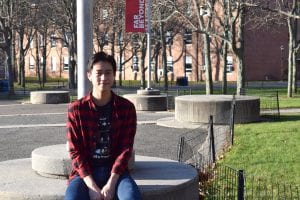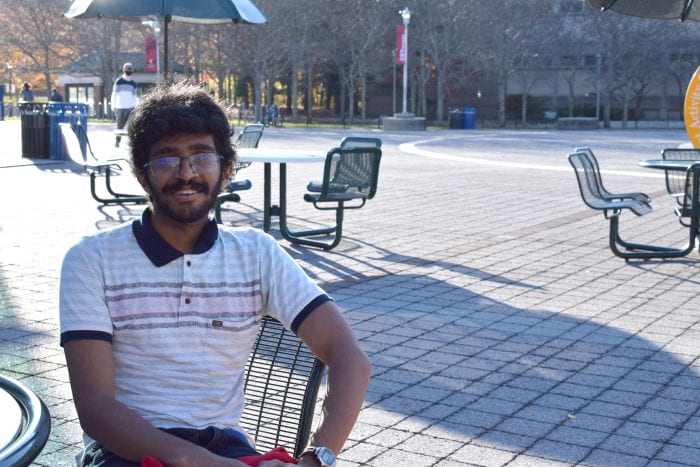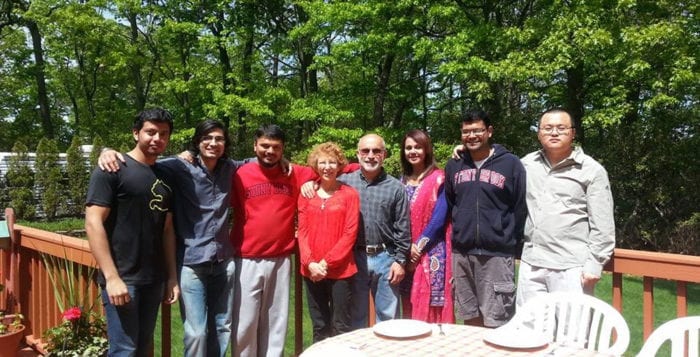Kaung Kyaw arrived in America when he was 19. “I’ve always thought since I came here that I’m a foreigner, so my opinions really don’t matter,” he said.
He is just one of more than 4,000 international students who come to study at Stony Brook University from 103 countries. They make up a large, diverse population either living on campus or nearby. Many credit this international community for driving the large numbers of ethnically varied offerings of both shops and restaurants in the Setauket/Stony Brook area. Their inclusion in the community has led to events like the annual Dragon Boat Race Festival in Port Jefferson and the Chinese New Year celebration by the Ward Melville Heritage Organization.

Kyaw, a 21-year-old student from Myanmar, came to the U.S. in 2018. He said he always had dreamt of coming to the United States and decided to choose SBU as his place of study to become a surgeon.
But before he traveled here, he remembers hearing that Donald Trump was elected as Republican president back in 2016. Kyaw’s initial thought was, “What were they thinking?”
“I thought it was so funny,” he said. “But now I’m living this reality and it’s not funny anymore.”
Kyaw is currently studying biology. After graduation, he said he would like to hopefully continue his education in the States. That, however, has been complicated by the president’s addition of his home country to a list of nations on a travel ban in January this year.
“If I get to stay here, I would practice here,” he said. “But right now, that’s not possible because of Donald Trump’s travel ban.”
He said that because of the current presidency, his view of America has morphed into a vision that isn’t always that welcoming.
“When he tried to send us all back a few months ago, that was really cruel and was really unfair,” he said. “We pay a lot of money to be here and study here. We don’t deserve this kind of treatment — nobody does.”
During the COVID-19 crisis, Kyaw said he was subjected to racism. He never imagined this when he considered coming here.
“I thought America would be this amazing place with lots of job opportunities,” he said. “I didn’t think of the racism or any other bad issues here. America was just this dream place to be in. But I got here, and these are topics we cannot escape — I didn’t know how much it’s ingrained into everyone’s minds.”
Minal Chawla, 19 from India, said she was just 17 when she decided to study abroad at Stony Brook. “Before coming to the U.S., I think I never paid much attention to what was happening in American politics and what was going here in general,” she said. “But now I try to keep myself up to date with all the latest happenings because I think in one way or the other, they affect me.”
Chawla, who is studying health sciences and journalism, said that there is so much happening in the U.S. that her future appears a little more unclear because of the uncertainties.
“I have a whole plan of what I want to do after graduation,” she said. “But now looking at the current scenario, I am unsure about whether I will be able to achieve it or not because the immigration policies can change at any moment and things can go south all of a sudden.”
She added that under President-elect Joe Biden’s new Democratic administration, she’s hopeful. “I hope that the decisions they take are in favor of all the international students who plan to work or settle in the U.S. after studies,” she said. “Currently, I am just trying to focus on the bright side and practicing gratitude by reflecting upon the things that I am thankful for.”
Veronica Alvarenga Hon, 21 from Costa Rica, has spent two-and-a-half years in the States. She said that before coming here, she always found the American electoral system to be interesting. In Costa Rica, they elect the president according to popular vote.
“I do have to say that for a long time, the U.S. portrayed itself as the leader of the free world — they were an example of what you could achieve by valuing freedom and respecting other people’s rights,” she said. “This, for some reason, made the U.S. seem more liberal in my mind. I was very surprised that many people were very conservative, even by my own standards.”
The 2020 election, to Hon, was polarizing. “President Trump often uses inflammatory rhetoric which only riles people up more,” she said. “I think this is just another example of the populist trend that we are seeing in the world. It was very disappointing to see so many people voting for the opposite of what I would consider American values, such as equality, freedom, respect and tolerance.”
“This, for some reason, made the U.S. seem more liberal in my mind. I was very surprised that many people were very conservative, even by my own standards.”
— Veronica Alvarenga
But she said it’s natural for people to disagree when it comes to politics. “I just don’t think it’s usually so personal to everyone,” she said.
Hon added that she viewed the election more about getting Trump out of office, rather than liking Biden.
“The U.S., once the leader of the free world, seems to have forgotten that to lead, you need people that will follow,” she said. “I am hoping that the Biden administration takes a different approach in their foreign policy — one that would consider rejoining the Paris Agreement, the World Health Organization and the JCPOA [known commonly as the Iran nuclear deal].”
Kyaw agreed. ”Trump being the president has shown you how much racism there is in America,” he said. “This was all there before he came in the spotlight. They just started expressing it and people started becoming nastier and nastier. We need to start fixing that.”
Abhishek Cherath, 21 from Mumbai [formerly Bombay] in India said in his opinion bringing back America to what it was before Trump’s presidency will not be easy.
“The things that are being put at risk by Trumpism are much longer lasting than anything else,” he said. “Politics is dirty. But the only alternative to politics is war — that’s not a good alternative.”
Under a Biden term in office, Cherath said he hopes things will be more pleasant among his American colleagues.
“I don’t really know what I’m going to do, but I hope America is OK,” he said. “Because there’s a lot of wonderful stuff that happens here, and it will be a real shame to just have that all vanish into a civil war.”






